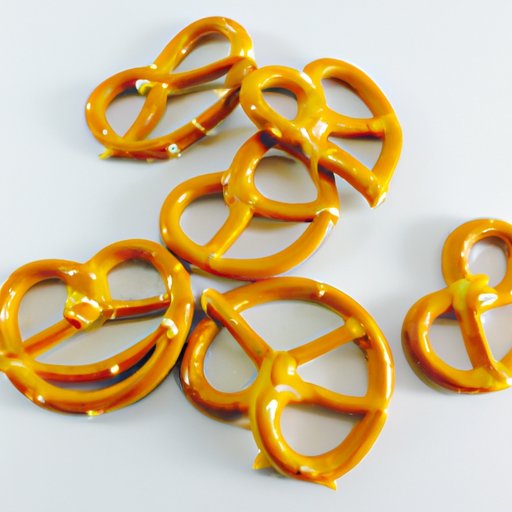Introduction
A pretzel is a type of baked snack food made from wheat flour, water, salt, and yeast. It has a unique knot shape and salty flavor that has made it a popular snack food for centuries. But are pretzels healthy? In this article, we’ll explore the nutritional benefits and risks associated with eating pretzels to help you make an informed decision about whether or not they’re a good snack choice.
Nutritional Benefits of Eating Pretzels
Pretzels are a good source of several essential vitamins and minerals. According to the USDA, a one-ounce serving of traditional pretzels contains 11% of the daily value (DV) for thiamin, 8% DV for niacin, 5% DV for folate, 4% DV for calcium, and 2% DV for iron. These nutrients are important for a variety of bodily functions, including energy production, digestion, and immune system health.
In addition to these vitamins and minerals, pretzels also provide some potential health benefits. A study published in the journal Appetite found that people who ate pretzels had higher levels of satiety than those who ate other snacks. This suggests that pretzels may be more filling than other snack foods and could help curb cravings.

Health Risks Associated with Eating Pretzels
Despite their potential health benefits, pretzels can also pose some risks. One of the main concerns is the high sodium content. A one-ounce serving of traditional pretzels contains around 230 milligrams of sodium, which is 10% of the recommended daily limit. Eating too much sodium can increase your risk of high blood pressure and other cardiovascular issues.
Pretzels are also high in fat, with a one-ounce serving containing 4 grams. Most of this fat comes from vegetable oils, which can be beneficial in moderation. However, if you eat too many pretzels, the excess fat can lead to weight gain and other health problems.
Finally, there is a potential risk of allergic reactions when eating pretzels. People who have allergies to wheat, gluten, or other ingredients used in pretzels should avoid them to prevent serious reactions.

How to Choose Healthier Pretzels
If you want to enjoy pretzels without the health risks, there are some things you can do to make them healthier. First, look for low-sodium options. Many brands offer reduced-sodium pretzels that are still flavorful but contain less sodium. You should also choose whole grain options, as these are higher in fiber and other nutrients than traditional pretzels.
Finally, avoid flavored pretzels. These often contain added sugars, artificial flavors, and other unhealthy ingredients that can negate any potential health benefits.

Comparing the Nutritional Value of Different Types of Pretzels
When it comes to choosing healthier pretzels, it’s important to compare the nutritional value of different types. For example, traditional pretzels are typically higher in fat and sodium than whole wheat pretzels. Soft pretzels tend to have more calories and fat than hard pretzels. And homemade pretzels are usually lower in sodium and fat than store-bought pretzels.
What Vitamins and Minerals are Found in Pretzels?
As mentioned earlier, pretzels are a good source of several essential vitamins and minerals. In addition to the ones listed above, pretzels contain other vitamins and minerals such as vitamin A, vitamin B, vitamin C, iron, calcium, and potassium. These nutrients are important for maintaining overall health.
How Many Calories are in a Pretzel?
The calorie content of pretzels varies depending on the type. Traditional pretzels contain around 110 calories per one-ounce serving. Whole wheat pretzels have slightly fewer calories at 105 per one-ounce serving. Soft pretzels have around 120 calories per one-ounce serving, while hard pretzels have around 90 calories.
Tips for Making Homemade Pretzels Healthier
If you prefer to make your own pretzels at home, there are some ways to make them healthier. First, use whole grain flours instead of refined white flour, as this will add more fiber and nutrients. You can also add healthy fats like olive oil or nut butter, which will make the pretzels more filling. Experiment with different spices to add flavor without extra sugar or sodium. Finally, reduce the amount of salt used to make the pretzels to lower their sodium content.
Conclusion
In conclusion, pretzels can be a nutritious snack if enjoyed in moderation. They contain several essential vitamins and minerals, and can even provide some potential health benefits. However, they are also high in sodium and fat, so it’s important to choose the right type and limit your intake. If you make your own pretzels at home, you can experiment with different ingredients to make them healthier. All in all, pretzels can be a tasty and nutritious snack if eaten in moderation.
(Note: Is this article not meeting your expectations? Do you have knowledge or insights to share? Unlock new opportunities and expand your reach by joining our authors team. Click Registration to join us and share your expertise with our readers.)
